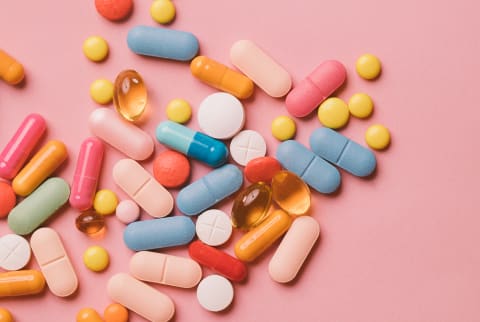Advertisement
You Should Make This Is A Nonnegotiable When Buying A Multivitamin



The marketing used for dietary supplements throws a lot of terms around that may or may not hold much meaning: pharmacist recommended, doctor-formulated, guaranteed quality, comprehensive, complete—the list goes on. However, certain terms—like high potency—are clearly defined and regulated by the U.S. Food & Drug Administration (FDA) and hold a lot of meaning.
What does high potency mean?
High potency is a nutrient content claim that was defined by the FDA1 in 1997. As mindbodygreen's director of scientific affairs Ashley Jordan Ferira, Ph.D., RDN, shares, "While nutrient content claims existed prior to 1997, this final rule in the late '90s amended those regulations to provide additional nuance and oversight for this 'high potency' claim and other specific verbiage."
According to the FDA, "the term 'high potency' may be used in a claim on the label or in labeling to describe individual vitamins or minerals that are present at 100% or more of the reference daily intakes (RDI) per reference amount customarily consumed." In other words: The product label and related advertising have to meet specific criteria.
Specifically, each ingredient included must be present in the dietary supplement at 100% daily value (DV) or higher to be considered high potency. When it comes to multi-ingredient supplements, another rule: At least two-thirds of the ingredients need to contain 100% or more of the DV for the product to make a high-potency claim.
Our high-potency multi formula.
Ferira points out that mindbodygreen's ultimate multivitamin+ is well above the two-thirds mark. "If you check out the product, turn it over—it becomes abundantly clear in the supplement facts panel," she once remarked on the mindbodygreen podcast.
In fact, ultimate multivitamin+ can claim a whopping 83% of its vitamins and minerals with DVs as high potency (which is well above the 67% requirement).
If you're currently holding a jar of the mbg multi in your hand, you may notice that a few ingredients—including the six longevity botanicals (resveratrol, piperine, glutathione, lutein, zeaxanthin, and lycopene) and a handful of micronutrients (i.e., boron, silica, and vitamin K2)—do not have established daily values.*
These ingredients are not included in the high-potency claim (or math) simply because they don't have official nutrient recommendations2 established by the Food and Nutrition Board of the National Academies of Sciences, Engineering, and Medicine (and therefore can't be included in the high-potency equation).
Why high-potency multis are a big deal.
When it comes to all micronutrient ingredients, the multivitamin/mineral supplement (aka multi) segment of the industry is notorious for excluding key nutrients altogether (hello, essential macrominerals) or "fairy dusting" or "sprinkling"—i.e., including nutritionally insignificant quantities of vitamins and minerals in a product in order to market it as having X number of ingredients (when it may as well not include the lower quantities of micronutrients or phytonutrients at all).
For this reason, mindbodygreen's high-potency multi claim is rare—and admittedly, we're quite proud of our formula. "We don't sprinkle. Sprinkles are for cupcakes—not multivitamins," notes Ferira.
Bestselling author and holistic nutritionist Kelly LeVeque finds the 33-ingredient formula impressive and next-level. "It's hard to pick just one, but my favorite feature of this multi is the high-potency, built-in B complex," LeVeque confesses.
What's so special about a high-potency B complex? Well, unlike most multis, ultimate multivitamin+ includes all eight B vitamins at two times the daily value (or higher) and considers their bioavailability and bioactivity in the body, as well.* Most people who take a B complex supplement have to do so in addition to their multi, but mindbodygreen combines these daily essentials to give individuals everything they need in one multivitamin.
"This complete array of all eight B vitamins is cutting-edge because the most bioactive forms are utilized, including methylation technology folate and B12. This directly supports personal differences in B vitamin metabolism and cellular energy for all,"* LeVeque explains.
The takeaway.
Considering taking a daily multivitamin? Be prepared to read a lot of nutrition labels and do a little bit of math as you're shopping for the multi that's right for you. If you're interested in a high-potency, robust-quality multi with a full array of essential vitamins, minerals, and bonus botanicals that support antioxidant activity, longevity, and whole-body health, then check out mbg's ultimate multivitamin+.*
